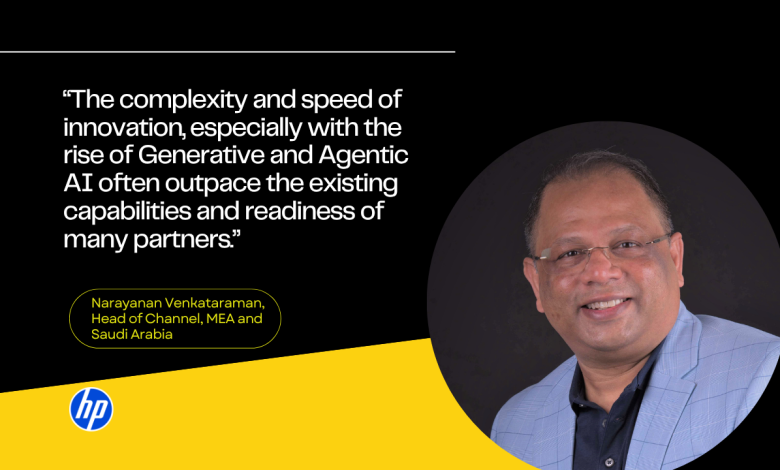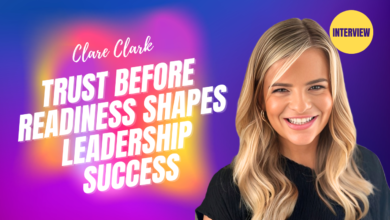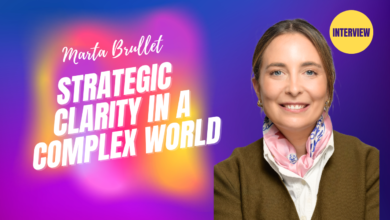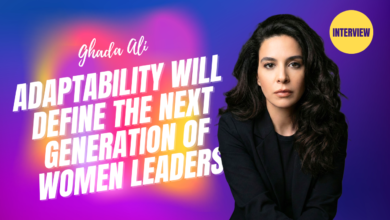“The IT Channel’s Challenges Include Navigating the Accelerated Pace of Technological Change”

Narayanan Venkataraman, the Head of Channel for Middle East, Saudi Arabia, and Africa at HP, says sustainable growth and profitability require partners to shift from transactional sales to value-centric, consultative engagements
Could you share an overview of your career path to date, highlighting the pivotal moments or achievements that have shaped your leadership within the IT channel?
I have been with HP for over 18 years, working across various roles that have shaped my understanding of the channel and helped me support partners across the region. My journey at HP started in channel and sales management, and over the years I have had the opportunity to lead different parts of the business – from distribution management in the UAE to category leadership and eventually taking on country and regional leadership roles.
Before HP, I spent time in a Sales role, which gave me useful insight into both sides of the channel ecosystem. Having worked in the UAE for over 24 years — and in the IT industry for more than 30, I have seen how this region has rapidly embraced new technologies. It’s been exciting to be part of that growth and to help partners stay competitive in a fast-changing market.
As a key channel influencer within your company, what are your primary roles and responsibilities in shaping strategy, driving engagement, and fostering growth within the partner ecosystem?
At HP, the channel is at the heart of our business — both globally and in the region. Our success is directly tied to the success of our partners. In my role as Head of Channel for the Middle East, Saudi Arabia, and Africa, I work on shaping and supporting the execution of HP’s channel strategy across this diverse and fast-moving region.
My focus is on building a future-ready partner ecosystem that can grow sustainably, adapt quickly to industry shifts—like the rise of AI and managed services — and continue delivering secure, personalized, and meaningful solutions to customers. My core responsibilities span three strategic pillars:
- Channel Strategy & Sales Growth (across channels): I lead the development and execution of a holistic channel framework that addresses regional dynamics, growth opportunities, and evolving customer demands. This involves defining go-to-market plans, setting performance targets, and expanding our footprint through strategic partnerships. A key focus area is enabling partners to shift toward outcome-based selling, leveraging programs such as HP Amplify AI and Managed Services Suite to drive profitable growth.
- Partner Enablement & Engagement: I oversee the enablement of our partner ecosystem through tailored training, digital tools, and consistent support mechanisms. This includes deploying initiatives like the Future Ready AI MasterClass and providing localized content via the HP Amplify Partner portal, ensuring they have the resources to effectively position HP’s offerings across segments and industries. We maintain close relationships with our long-standing and new channel partners — resellers, distributors, and system integrators ensuring we understand their business models and collaborate on growth strategies. My role includes regular engagement through joint planning, business reviews, and strategic workshops to ensure mutual success.
- Performance Optimization & Market Insight: My team and I track partner performance using a mix of sales KPIs, market analytics, and revenue forecasts. We use these insights to refine our approach, optimize incentive models, and identify under-penetrated opportunities. Additionally, I work cross-functionally with product, marketing, and sales teams to ensure execution is cohesive and that channel feedback informs portfolio planning and campaign development.
How would you assess the current health and evolution of the IT channel, particularly within our region? What significant trends or shifts are you observing?
The IT channel in our region is undergoing significant transformation, characterized by three dominant shifts:
- AI-led disruption: AI capabilities are moving from the cloud to the device itself, driven by innovations like AI PCs (NextGen AI PCs) and HP’s use of on-device NPUs for real-time AI workloads.
- Service orientation: There’s a clear shift in the market toward service-led engagement, as customers increasingly look for flexible, outcome-based solutions rather than one-time product purchases. HP’s portfolio of Managed Services, including the new Managed Device Services, Managed Print Services, and subscription-based offerings, allows partners to meet this demand effectively. By delivering ongoing services such as predictive support, device lifecycle management, and security monitoring, partners can move beyond transactional sales to establish recurring revenue streams that are directly tied to the value they provide to customers over time. This not only improves profitability but also strengthens long-term customer relationships.
- Increased customer centricity: Channel players are shifting from transactional engagements to consultative roles, delivering tailored industry solutions and outcome-based value keeping customer needs at the core of everything.
What do you see as the single biggest challenge facing the IT channel in the region today, and conversely, what is the most significant untapped opportunity for partners?
The most pressing challenge for the IT channel in our region today is navigating the accelerated pace of technological change, particularly in areas such as AI integration, cybersecurity preparedness, and evolving customer expectations. The complexity and speed of innovation, especially with the rise of Generative and Agentic AI often outpace the existing capabilities and readiness of many partners. This has created a widening skill and knowledge gap, making it harder for some to transition from traditional product-based selling to value-based, solution-driven engagements.
To help partners overcome this challenge, HP has taken a multi-layered enablement approach:
- Future Ready AI MasterClass: Delivered through HP University, this comprehensive program empowers partners with real-world use cases, technical pathways, and customer engagement strategies focused on AI. It’s designed to elevate partner expertise in AI-enabled productivity, device intelligence, and service delivery.
- Amplify AI Program: This specialized track within HP’s Amplify Partner Program offers executive-level bite-sized training videos, technical certifications, and access to AI experts. It helps partners understand not just the technology, but how to package and sell outcomes around AI-powered solutions.
- HP recently held a full day, face-to-face Amplify Elevate training session focused on NPIs for partners. This training was part of the broader HP Amplify program, which aims to drive partner growth and provide a consistent customer experience. The session was designed to equip partners with the knowledge and tools to effectively sell and support HP’s latest offerings, including AI-powered PCs and other innovations.
- HP offers a unified and comprehensive partner program through HP Amplify, combining training, certifications, and strategic incentives to help partners grow in high-impact areas like AI, digital services, and sustainability. With specialized tracks such as Amplify AI, partners gain access to personalized learning via the AI Hub, AI MasterClass, and role-based certifications — all focused on real-world AI use cases and workstation solutions. Those who invest in these focus areas can unlock incremental rebates and recognition, while HP’s Amplify Impact program supports partners committed to sustainability and digital equity. The program’s simplified structure rewards performance, collaboration, and capabilities to deliver consistent customer outcomes.
- HP Partner Portal: The HP Partner Portal serves as a centralized, all-in-one platform for partners to access everything they need to succeed—localized training, go-to-market content, sales enablement resources, and product updates. What sets it apart is its insight-driven approach: it integrates real-time data, market intelligence, and collaboration tools to help partners make informed decisions, optimize performance, and stay aligned with HP’s evolving roadmap. It’s one of the first platforms of its kind in the industry, built specifically to support partners in accelerating digital transformation and delivering customer-centric solutions at scale.
- HP’s Workforce Experience Platform (WXP): Through predictive analytics and AI-driven telemetry, WXP allows partners to offer data-backed devices management, refresh strategies, and proactive support, shifting their role from transactional sellers to strategic advisors.
On the opportunity side, the AI-PC revolution and sustainability-as-a-service represent two of the most significant and under-leveraged growth vectors for partners:
- AI is now moving from the cloud to the device, offering partners new avenues to deliver endpoint intelligence, managed services, and workplace transformation consulting.
- Through Amplify Impact, partners can integrate sustainability into their offerings — such as device lifecycle management, sustainable procurement strategies, and carbon footprint tracking —allowing them to differentiate with customers who prioritize ESG commitments.
In your opinion, what are the most effective strategies partners can employ to drive sustainable growth and profitability in the current market, especially considering evolving customer demands?
At HP, we believe that sustainable growth and profitability require partners to shift from transactional sales to value-centric, consultative engagements. The most effective partner strategies must center on three key pillars: outcome-based selling, AI-led innovation, and purpose-driven differentiation.
- Shift from Product to Outcome-Based Selling: Customers today demand solutions that address specific business outcomes — be it workforce productivity, hybrid work enablement, or cost optimization. Partners must evolve their engagement from device specifications to business impact storytelling. HP supports this transition through:
- HP Amplify Sales Toolkits – complete with solution playbooks, ROI calculators, and vertical use cases to help partners lead with value.
- Real-world scenarios for AI PCs, showing how AI-native endpoints can automate workflows, enable real-time collaboration, and reduce reliance on cloud infrastructure.
- Leverage AI and Multi-Category Solution Selling: The emergence of AI across the endpoint and infrastructure stack is a transformational opportunity. Partners should:
- Promote AI use cases in education, SMB, creative industries, and the public sector, supported by HP’s Amplify AI training, NVidia Workstation MasterClasses, and customer-ready use cases.
- Take advantage of HP’s Amplify SuperPower Booster, which rewards partners for AI-led solution sales across hardware, services, and software — beyond just transactional volume.
- Invest in Upskilling and Specialized Enablement: Rapid innovation demands that partner leadership stays informed and agile. HP offers:
- A condensed executive learning path, with bite-sized, video-based training modules focused on AI business applications.
- Role-based enablement via HP University, covering technical, commercial, and vertical-specific capabilities.
- Embedded Sustainability into the Core Go-To-Market Strategy: Sustainability is becoming a key factor in procurement and vendor selection, especially in enterprise and public sector accounts. Through the Amplify Impact program, HP equips partners with tools to:
- Build ESG-aligned offerings
- Measure and communicate carbon impact
- Deliver services like recycling, remanufacturing, and green procurement consulting
How is the rapid advancement of AI, including Agentic AI and Generative AI, fundamentally reshaping the channel’s business models, partner opportunities, and the skill sets required for success?
Generative and Agentic AI are fundamentally altering how partners operate:
- Business models are evolving from one-time transactions to consultative, service-based engagements.
- AI is enabling predictive support, smarter device management, and automated customer interactions, all of which are integral to HP’s WXP.
- New sales roles are emerging, partners must become AI consultants who understand customer workflows, not just product features.
Given the escalating sophistication of cyber threats, how can channel partners best position themselves to deliver comprehensive cybersecurity solutions, moving beyond traditional offerings to address emerging risks like AI evasion?
With today’s increasingly hybrid workforce, security has become more critical than ever. Traditional endpoint protection is no longer enough—partners need to offer comprehensive, proactive solutions that address both known and emerging risks, including AI-driven threats and evasion techniques.
HP enables this through HP Wolf Security. Key capabilities include:
- Automated threats isolation and containment at the hardware level
- Cross-platform endpoint monitoring — even across non-HP devices
- Remote device management and policy enforcement, ideal for hybrid work environments
- Security-as-a-service bundled into managed offerings for recurring revenue
One of HP’s key differentiators is the ability to secure and manage devices remotely, helping partners support customers at scale while maintaining strong cyber hygiene. This is especially important given that regular OS and firmware updates — such as those in Windows — can create temporary vulnerabilities if not properly managed.
To stay ahead, partners should combine these technical solutions with customer education, vertical-specific security packages, and compliance-focused consulting. HP provides tools, platforms, and partner enablement resources to help channel partners deliver real value in this space — protecting end-users while creating long-term business opportunities.
Environmental, Social, and Governance (ESG) factors and sustainability are gaining prominence. How can channel partners integrate these principles into their operations and offerings to create competitive advantages and meet evolving client expectations?
Across the Middle East and Africa, governments and businesses are setting bold sustainability agendas, and HP is fully aligned with these regional priorities through our global commitment to carbon neutrality and environmental stewardship. Through HP Amplify Impact, we enable our partners to integrate ESG into their operations and customer engagements in meaningful ways. This includes:
- Offering certified, energy-efficient, and sustainably designed HP products that meet stringent environmental standards
- Supporting recycling programs, device take-back initiatives, and carbon-neutral offerings
- Embedding sustainability into the sales process with green certifications, impact reporting, and customer education
- Helping partners align with country-specific ESG goals by providing tools, training, and co-branded sustainability resources
HP’s long-term vision for reducing carbon emissions and environmental impact helps partners not only meet compliance requirements but also position themselves as forward-thinking and responsible providers.
The IT landscape demands continuous learning. What advice do you have for channel partners on attracting, developing, and retaining top talent, particularly in areas like AI, cloud security, and specialized industry solutions?
In today’s fast-changing tech landscape, staying relevant means constantly reskilling and adapting. As technologies like AI and cloud security evolve, partners must build teams that are both technically strong and deeply customer-centric.
- Invest in structured career development: Define clear growth paths in high-demand domains such as AI architecture, cybersecurity, and vertical solutions. This not only helps attract top talent but also supports long-term retention.
- Leverage learning platforms like HP University: We offer role-based, industry-aligned training paths, certifications, and practical learning modules — designed to help technical and commercial teams stay ahead.
- Promote cross-skilling and continuous learning: Encourage employees to broaden their skillsets across functions. For example, enabling technical staff to understand customer engagement better, or sales teams to gain foundational AI knowledge, creates more agile and well-rounded teams.
How do you see the roles of different partner types — such as Managed Service Providers (MSPs), Independent Software Vendors (ISVs), and system integrators — evolving, and how can they best collaborate to deliver integrated solutions?
As technology evolves — particularly with the rise of A — the lines between partner types are blurring. Each is moving toward solution co-creation, where collaboration is key to delivering value.
- MSPs are expanding into predictive and AI-driven services, managing endpoints, security, and support through recurring models.
- ISVs are developing industry-specific applications that integrate with HP’s platforms to enhance productivity, intelligence, and automation.
- System Integrators are acting as solution orchestrators, bringing together hardware, software, and services into cohesive offerings.
At HP, we see our role as an unifier, bringing these partner types together into a unified ecosystem. Through programs like HP Amplify, and tools like the Workforce Experience Platform, we enable integrated go-to-market strategies and cross-partner collaboration. The future lies in this ecosystem approach, where shared expertise leads to more complete, customer-ready solutions that combine AI, security, services, and sustainability.
Drawing from your experience and looking ahead, what is your most crucial piece of advice for partners seeking long-term success and relevance in this rapidly transforming IT channel?
My core advice is simple: put the customer at the center, especially as the future of work continues to evolve. Success in today’s channel isn’t just about selling the latest technology, it’s about understanding how customers work, what challenges they face, and how you can add value beyond the product. Partners that align their offerings with evolving workplace needs – whether it’s enabling hybrid work, integrating AI, or delivering sustainable solutions — will be the ones who stay relevant.




